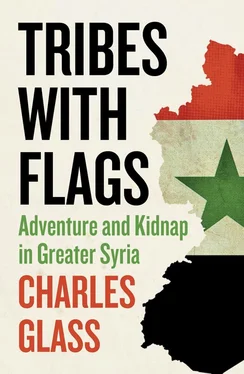Orwa Nyarabia is a thirty-five-year-old film producer, who among other activities organizes the Damascus Film Festival. He has worked with younger colleagues to organize peaceful demonstrations and street theater to undermine belief in the all-powerful, all-knowing regime. He confesses to embarrassment that he has avoided arrest while all the youngsters in his office have spent short periods in jail. For him, the protests that erupted in Dera’a last year were not surprising. “It’s been cooking for a while,” he told me in the coffee shop of Damascus’s Omayyad Hotel. “In my domain, documentaries, we showed films on dictatorship in Burma and China. The censors passed it, but the audience came out discussing Syria.” When his film festival asked audiences to vote for the best film in 2008, the newspaper headline was, “First Free Vote in Syria.” He said, “The regime blackmailed us with accusations that we were about political provocation. I told them I’m a total liberal businessman.”
Most opponents of the regime, apart from the “official” candidates, dismissed the May elections as irrelevant. Most recall a joke told about the referenda staged every five years by Hafez al-Assad, to endorse his tenure. An official brought him the results: “Mr. President, you have won again with 99.9 percent approval. Only 450 people voted against you.” The president glowered. The official pleaded, “What more could you want?” The president replied, “Their names.”
Nyarabia said that when young people in Dera’a campaigned to ban smoking in public places as far back as 2005, “It was really to have a campaign.” The opposition is finding its way, learning from mistakes and making new ones. It lacks the experience of the regime, as well as the regime’s armory of control. “Two weeks ago, I was talking to the leader of a militia,” Nyarabia, who is half Alawite and half Sunni, said. “There is a danger of becoming sectarian. They are becoming anti-Alawi rather than anti-regime.” The reason for this, he and his friends believed, was that Saudi Arabia provided arms and funds to those closest to its own Wahhabi ideology rather than to liberal democrats. This, combined with threats from Syrian mullahs broadcasting on satellite television from Riyadh, frightens the minorities more than anything else about the opposition.
So far, the regime is holding out. There have been no defections from the regime among its senior members, although this is less an indicator of loyalty than of cold calculation that the opposition is a long way from achieving power. Few soldiers have deserted the army to join the rebels. Some people from Homs told me of their anger at the Free Syrian Army for making their city the crucible of the revolution, then abandoning the populace to its fate when the regime counterattacked.
Like Vichy France, Syria today is divided into supporters of the regime; résistants; and the attentistes, who await the outcome before choosing sides. Most of those I spoke to in all three camps rejected military intervention by the United States, Britain, France and, especially, Turkey, to solve their problems. The Armenian Catholic archbishop, Monsignor Maryati recalled, “Relating to Turkey, many Armenians in Aleppo came from the massacres in Turkey and were forced to leave their country in 1915. They found in Aleppo a secure shelter. They have the rights of any Syrian. They became part of the Syrian identity. They had many martyrs who defended Syria. Psychologically and spiritually, we have some worries—especially intervention by Turkey. We are afraid to be forced into a new emigration.” Even the non-Armenian bishops who spoke to me in Aleppo and Damascus dreaded invasion by the Turkish army. Turkey, they pointed out, does not allow churches to conduct services freely as in Syria and prevented Arabs in Hatay Province, part of Syria until the French gave it to Turkey in 1938, from speaking their language. In Syria, they can speak whatever language they want. In Aleppo, Muslim children are the majority in most Christian-run schools where teaching is in French. As the Armenians fear the Turks, Alawites and Christians fear Sunni Salafists who chant,
Messiahi alla Beirut (Christians to Beirut),
Alawiah alla tabut (Alawis to the coffin).
Syria’s anti-imperial history dates from its violent rejection of the French occupation of Syria from 1920 to 1945, when the French destroyed much of Damascus and other cities to maintain their rule. The near-universal view is that the United States, which until 2004 shipped suspects to Syria for special treatment, objects less to the regime’s repression than to its alliance with Iran. If the United States and Israel are contemplating an attack on Iran’s nuclear facilities, it would make sense to sever the link between Syria and Hezbollah in Lebanon. Some Syrians fear the revolution has become a tool of the United States, Saudi Arabia, and Israel to defeat Iran. That was not why the uprising began nor why so many have become part of it. The perception that outside powers are changing the revolution’s objectives can only rob it of popular support, particularly at a time when the regime has the upper hand militarily and opponents resort to sending car bombs into security buildings and busloads of policemen that kill as many civilians as soldiers.
One Christian said to me in a whisper, “I shit on this revolution, because it is forcing me into the arms of the regime.”
Charles Glass
Dauphin, Alpes-De-Haute-Provence, France
PART ONE CONTENTS Title Page TRIBES WITH FLAGS Adventure and Kidnap in Greater Syria CHARLES GLASS Dedication Frontispiece Detail from “Syria”, Tallis’ Atlas, 1841 Epigraph New Introduction by the Author PART ONE 1The Legacy of Alexander 2The Army of the Levant 3The Last Ottoman 4Minarets and Belfries 5No-Man’s-Land PART TWO 6Six-Star Brandy 7Where Armies Failed 8A Consular City 9The Survivors and the Dead 10The Village of a Pasha 11The Road PART THREE 12The Old City 13Meleager’s World 14This Bad Century 15Queen of the Desert 16Provincial Loyalty 17Enemies of the Goddesses PART FOUR 18Excursions 19A Blood Feud in the Mountains 20Foul is Fair 21The Ghetto 22Monks and Martyrs 23The Family and the Plain 24The Slumber of the Dead 25Disrespectful Dancing 26The Last Day PART FIVE 27The Black Hole 28Recalled to Life About the Author Also by Charles Glass Copyright About the Publisher
CHAPTER ONE CONTENTS Title Page TRIBES WITH FLAGS Adventure and Kidnap in Greater Syria CHARLES GLASS Dedication Frontispiece Detail from “Syria”, Tallis’ Atlas, 1841 Epigraph New Introduction by the Author PART ONE 1The Legacy of Alexander 2The Army of the Levant 3The Last Ottoman 4Minarets and Belfries 5No-Man’s-Land PART TWO 6Six-Star Brandy 7Where Armies Failed 8A Consular City 9The Survivors and the Dead 10The Village of a Pasha 11The Road PART THREE 12The Old City 13Meleager’s World 14This Bad Century 15Queen of the Desert 16Provincial Loyalty 17Enemies of the Goddesses PART FOUR 18Excursions 19A Blood Feud in the Mountains 20Foul is Fair 21The Ghetto 22Monks and Martyrs 23The Family and the Plain 24The Slumber of the Dead 25Disrespectful Dancing 26The Last Day PART FIVE 27The Black Hole 28Recalled to Life About the Author Also by Charles Glass Copyright About the Publisher
THE LEGACY OF ALEXANDER CONTENTS Title Page TRIBES WITH FLAGS Adventure and Kidnap in Greater Syria CHARLES GLASS Dedication Frontispiece Detail from “Syria”, Tallis’ Atlas, 1841 Epigraph New Introduction by the Author PART ONE 1The Legacy of Alexander 2The Army of the Levant 3The Last Ottoman 4Minarets and Belfries 5No-Man’s-Land PART TWO 6Six-Star Brandy 7Where Armies Failed 8A Consular City 9The Survivors and the Dead 10The Village of a Pasha 11The Road PART THREE 12The Old City 13Meleager’s World 14This Bad Century 15Queen of the Desert 16Provincial Loyalty 17Enemies of the Goddesses PART FOUR 18Excursions 19A Blood Feud in the Mountains 20Foul is Fair 21The Ghetto 22Monks and Martyrs 23The Family and the Plain 24The Slumber of the Dead 25Disrespectful Dancing 26The Last Day PART FIVE 27The Black Hole 28Recalled to Life About the Author Also by Charles Glass Copyright About the Publisher
Читать дальше












